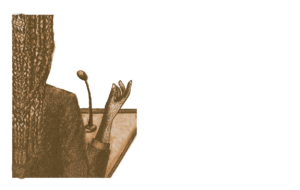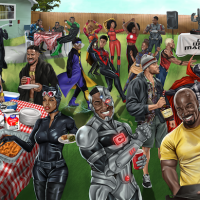A 2013 study found that 75% of whites in America don’t have more than a passing acquaintance with any black people.
At the workshop I facilitated on 5/26/18, “Honest And Effective Conversations About Race”, my content was geared toward a white audience. I hoped to attract more curious white neophytes to the discussion of race. This crowd was mostly people involved to some degree in social justice endeavors of one kind or another. My closing point was making real and personal connections with actual black people, tempering that with time spent at marches and buying Black Panther tickets, could lead to answers many white people are seeking regarding blacks and race relations in general. People asked me “but how do we do that, meet more black people, given how divided our city is?” I wish I’d spent more time answering that. At the time I really didn’t get that it was a real question, I thought it no more than knee-jerk hyperbole. As I look back on the chats I’ve had in weeks past while inviting people to this workshop though, I recall the surprising number of white people among progressive racial justice activists who admitted to still not having any black friends.
In the movie Philadelphia, Denzel Washington, as lawyer Joe Miller, questioned witnesses on the courtroom stand with the preface “now, explain it to me like I’m a four-year old.” White people, I’m going to break it down for you.
First and foremost, do not fetishize black people. In an episode of the early 90’s sitcom Ellen, the lead character was dating an “American Gladiator” named Nitro. Her friend Adam became smitten with the idea of having a television athlete among the ranks of people he could call friends. Adam and Nitro had nothing in common on which to build a friendship other than Adam’s fascination with being friends with a pro-athlete. Nitro was no more to Adam than a thing called “pro-athlete”, and Nitro found Adam’s attempts at connection understandably annoying. Nitro was a fetish object instead of a real, three-dimensional person.
In my younger (slimmer) days I was at a house party. The host, a white guy, started yammering in my ear about how he’d never been with a black girl and if I’d just go upstairs with him, I could change his whole world. Now, I’d had more than a few gin-and-tonics and if he’d approached me like any other attractive and interesting girl he wanted to spend time with, he could have probably had all this. But I knew this wasn’t about me at all, that I was no more to him than a story to tell his buddies later on. I was a thing, a “black girl”, a fetish, not a multidimensional person. How great could the experience be for me with someone who couldn’t even see me as a person? Pass, thanks.
Don’t go searching out a black person solely for your need to have black people in your life. We smell your need. And you know from your own experience that being around someone whose only real bond with you is their need becomes laborious. Race, then, isn’t the barrier here anymore.
Next, look for people you have common interests with who happen to be black. Black people don’t just sit around talking about police brutality, “microaggressions”, and “intersectionality” all day. We are as compound as anybody else.
Let’s imagine Tim’s a white guy who is a huge comic book fan from way back. Tim has seen the Marvel Studios blockbuster Black Panther on the big screen seven times. At the movie’s end, the fictional isolationist African nation of Wakanda decrees it will open its borders, sharing its advanced technology with the rest of the world. Most immediately viewers are prone to imagine a line of people linking hands singing the chorus of “We Are The World.” As a black person, my heart sank to the pit of my stomach at this ending. All I could see was Native Americans helping the Mayflower Pilgrims through that first winter at Plymouth Rock. We all know how that ended. In talking with black comic book aficionados, Tim may find another who interpreted the movie’s ending the same as I did. Without having to open an encyclopedia of “woke” racial justice terms, Tim is now learning something about how blacks experience the world differently than he does. Voilà.
Tim’s new friend has an original 1938 Action Comics print edition of Superman from his grandfather’s attic and invites Tim over to see it. Tim meets his new friend’s wife Shanice, who happens to be in the same line of work as Tim. She mentions she got no reply when she sent her resume to the company he works for. Tim peruses Shanice’s impeccable resume, knows for a fact there are several openings at his company, and listens to Shanice’s tales of industry-wide rejection. While listening, maybe this is the first time Tim notices consciously that there are barely a smattering of people in his office named Shanice, Gurdeep or Alejandro.
Do you see where I’m going here people? Tim could spend thirty-eight dollars on the latest Ta-Nehisi Coates book, or take Shanice’s resume to HR and put in a compelling word on her behalf. Shanice would be sitting next to him every day, and he’d have two black friends he has something in common with. More importantly he’ll have done something concrete about pay equity, workplace discrimination, exercising his white privilege towards the good of others, health care disparities because Shanice has insurance through her job, education because Shanice can now afford a tutor for her son, and so much more. Heck, Shanice might have a black girlfriend who’s “down with the swirl” and has a liking for social justice-minded comic book nerds. You won’t get that kind of hook-up reading a T-Nehisi Coates’ tome.
You’re a white mom and your daughter has made friends with a black girl in ballet class. You also find out your daughter’s friend lives along the route you drive to class. You seek out the girl’s mother and offer to arrange carpooling. Carpooling turns into play dates, turns into an afternoon of you and the mom drinking mint tea talking about why you enrolled your daughters in ballet. The mom mentions what an inspiration Misty Copeland, American Ballet Theatre’s first black female principal dancer, was on her daughter and the two of you discuss body image, media norms, and what a struggle it can be to keep your daughters’ expectations realistic and foster healthy self esteem. The mom is taking her daughter to a performance of Giwayen Mata, an exceptional all woman African dance troupe visiting from Atlanta, and invites you to come…
Not one demonstrative Martin Luther King Jr. quote necessary on your part. As the two of you move from dance moms to real friends, you can discuss all the uncomfortable race related queries you have because inside of your friendship there is room for more candid talk.
Lastly my white friends, understand that blacks, in general, really do have a different relatedness with time than the white world. I was invited to a white co-worker’s house for Thanksgiving dinner one year. She said dinner is at 2:00. I arrived around 3:30, and was genuinely surprised everyone was done eating. When I was growing up, Thanksgiving dinner was the host’s house is open and there are various sets of people coming and going all afternoon into the evening. Come in, fix yourself a plate, and get comfortable wherever there’s room. To actually arrive at 2:00 meant to be stuck helping to peel sweet potatoes, who wants that? I also knew I wouldn’t know anyone else there. I didn’t want to arrive before (I thought) the dinner itself was the topic of conversation and have to struggle with small talk.
For us, getting together doesn’t mean pulling out your calendar to “see what we can move around.” It’s a lot more spontaneous and casual. We run on someone else’s schedule for forty hours a week, getting together with friends shouldn’t be work too. This past Memorial Day weekend, a friend told me he’d be grilling in the backyard Saturday or Sunday and I was invited. I didn’t hear from him Saturday. Sunday I called him around 2:00. “Yeah, everything’s almost done,” he told me. “Come on through whenever you’re ready.” That’s what we do, we “come through.” In the summer, people know if you drive by my house on a sunny Saturday afternoon, the screen door is visible and my car is parked out front, that’s an open invitation to “come on through.”
So when your black friend calls and says “my boy just called and we’re all going to his place to play pool, can I come pick you up?”, the incorrect answer is “gee, I’d love to but next time could you give me more of a heads up?” Incorrect answer, if enriching your circle of non-white friends is truly a priority for you.
And there you have it. Black Friends 101, a crash course. I’ll be dying to hear feedback from people who have taken my suggestions so be sure to come back and leave me a note.

